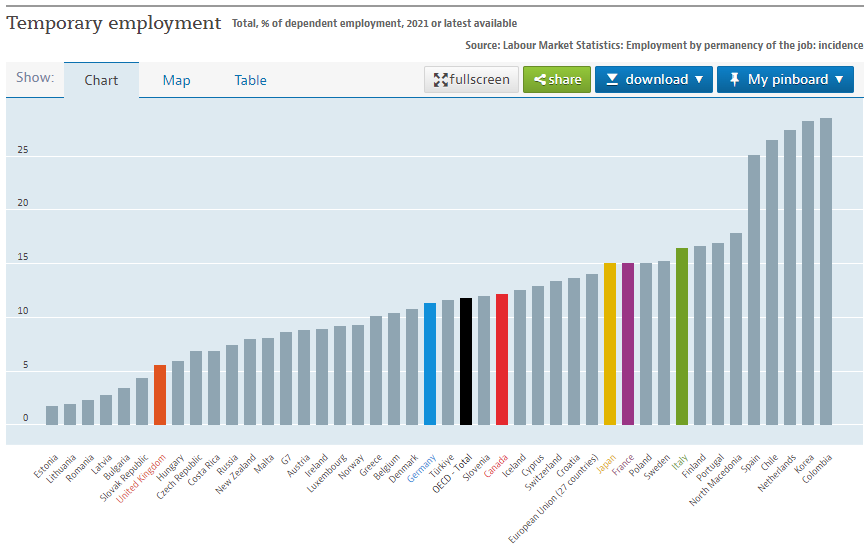Are you looking for a way to supplement your income or gain valuable work experience? Temporary workers are increasingly in demand across many industries, providing an opportunity to explore different roles and gain new skills.
Whether you’re seeking short-term employment while searching for a job, want to work on specific projects, or need flexible scheduling options that fit around family commitments – temporary work could be the perfect solution.
In this guide, we’ll explain what temp agencies do and how they can help you find suitable assignments. We’ll also provide tips on preparing for interviews with staffing companies and advice on making the most of your temp role once hired. Read on for everything you need to know about temporary employment!
What Are Temporary Workers Called?
The term ‘temporary worker’ is used to describe any employee, contract, or freelance worker who has been hired for a limited time period. This can range from a single day to several months and beyond depending on the needs of the employer.
Temporary workers are also referred to as “contingent labor”, “temps”, or “contractors” and can fill a variety of roles. These include short-term positions such as clerical or administrative staff, customer service representatives, and data entry clerks, to seasonal retail salespeople or agricultural workers.
What Is A Temp Agency?
Temp agencies are companies that match employers with temporary workers for specific assignments. They provide a valuable service for both parties, helping workers to gain experience and employers to easily source skilled labor on an as-needed basis.
Most temp agencies specialize in particular industries or job roles, so they can quickly match you with the right assignment based on your skills and prior work experiences.

Why Use A Temp Agency?
Temp agencies offer a range of advantages for job seekers. They can help you gain valuable work experience, expand your professional network and build up your resume with relevant roles that fit around other commitments such as study or family life.
Employers also benefit from using temp agencies as it’s a cost-effective way to find skilled staff at short notice. This can be especially useful in industries with seasonal or unpredictable fluctuations in demand, such as hospitality, retail, and IT services.
How To Find A Temp Agency?
There are many temp agencies and recruitment firms that specialize in providing temporary workers to employers. You can look for local agencies by searching online or through business directories, or contact staffing companies with a nationwide reach.
Before signing up for any temp agency, it’s important to research their services and policies. Make sure you understand the type of assignments they offer and how long each position is likely to last. You should also check when you’ll be paid and what is expected in terms of the notice period.
Preparing For A Temp Agency Interview
When you have identified a suitable temp agency, it’s time to prepare for the interview and showcase your skills. Make sure you update your resume and research the company before attending the meeting. Be prepared to discuss past work experience and how this could add value to future temporary assignments.
It’s also a good idea to think about how you can be flexible and open-minded when it comes to working in different roles. Showing that you are willing to take on new challenges will demonstrate your commitment to making the most of the opportunity.
What Is An Example Of A Temporary Job?
A temporary job can cover a wide range of industries and roles. Some examples include:
- Receptionist
- Data entry clerk
- Warehouse worker
- Chef
- Cleaner
- Customer service representative
- Administrative assistant

What Is The Opposite Of Temporary Worker?
The opposite of a temporary worker would be a permanent employee.
A permanent employee is someone who has been hired for an indefinite period and with the expectation that they will remain in their role long-term.
It’s important to note that even if you are classified as a ‘permanent employee’, this doesn’t mean that you can’t still be dismissed at any time with appropriate notice.
How Much Do Temporary Workers Make?
The salary of a temporary worker will vary depending on the job role and sector they are working in.
It is usually based on an hourly or daily rate, which employers will have negotiated with the temp agency.
The hourly rate for entry-level roles can start at around $10-$14, while experienced professionals in more specialized roles might expect to earn up to $20 per hour.
Temporary Employment Contract
If you are offered a temporary assignment through a temp agency, you will usually be asked to sign an employment contract.
This is important as it outlines the terms and conditions of your role and covers topics such as pay rate, hours of work, employer obligations and termination procedures.
It’s important to read through any contract carefully before signing and make sure you understand everything that is included.
Temporary Employee Laws
It is important to understand the laws and regulations that apply to temporary employees.
These can vary from state to state, so it’s important to do your research before taking on any assignment.
Generally speaking, a temp worker should be offered the same rights and benefits as permanent staff in relation to minimum wage, overtime pay, holiday entitlements and health and safety.

Temporary Workers: Pros for Businesses
In the spirit of optimism, let’s start with the pros. The main reason temps even exist is because of sudden fluctuations in the flow of business.
There are a few common causes for a business to take on temporary workers. There might be a sudden illness or absence in an employee, which needs to be catered for. Or, you might have a deal dropped in your lap which requires better productivity. Retail businesses might need temps for peak-time seasons.
Other ventures might have special projects which they need to keep up with. If your business runs into something which means there’s suddenly more work to be done, then taking on temps could be a quick fix. By keeping a stable of temps ready, you’ll also be able to be a more flexible boss and let permanent employees have left at shorter notice.
When you’re able to do this, it can really improve the morale of your whole workforce. Making your business compatible with temps is also a great way to find more talent.
You can take a worker on without making a commitment, observe how they’re doing, and decide whether or not to take them on permanently.
Temporary Workers: Cons for Businesses
Probably the biggest drawback of temporary workers is the need to train them. This will be at least a minor issue, no matter how much experience they have in a similar role.
Every business will have some acute differences in the way they run things. When your temp starts work, they’re going to be shaky and may set things back by making mistakes. If you’re in your start-up period, then you may not be able to afford even minor slip-ups.
An extra pair of hands might sound great on the surface. However, you’ll always need to set some resources aside for training new temps. Entrepreneur has a helpful article on training new employees. Another big con is there can be a range of legal issues related to hiring temps.
Various recent cases have emphasized the importance of contracting temporary staff properly. If you’re thinking of hiring some temp, then make sure to have a long sit-down with your legal counsel.
There can’t be even the slightest doubt about the workers’ status, or about their eligibility for benefits. If you neglect this too much, you could end up with a full-scale lawsuit on your hands!
Making The Most Of A Temp Role
Once you have been hired, make sure you give your all to the position. Just because it’s a temporary role doesn’t mean that you can slack off or miss deadlines. It’s essential to come across as reliable and professional so that you can stand out from other temp workers.
Make sure to ask questions about the role and take the initiative to get involved with other tasks as much as possible. This will show your employer that you are keen to learn new skills and become a valuable asset.
Temporary employment can be an excellent way to gain experience and build up your CV, so make sure you take advantage of any opportunity that comes your way! By understanding the benefits of using a temp agency and making the most of each role, you will be well on your way to establishing yourself in the job market.
Temporary Employment Statistics
According to the Bureau of Labor Statistics, there has been a steady increase in the use of temporary employment over the last five years or so. In 2019, there were over 4.3 million temporary or contract workers in the US, representing 2.% of all employed people in the country.
This data that more and more people are turning to temp work as an alternative to full-time employment, which could be due to a range of reasons such as flexibility, short-term commitments, and economic uncertainty.
Therefore, understanding how to make the most of a temp role can be an invaluable skill for job seekers in today’s market.

The Bottom Line
Temporary employment is an increasingly popular option for both employers and employees. It offers many advantages, such as flexibility, short-term commitments, access to talent pools, and the ability to fill gaps left by permanent employees.
However, there are some cons such as the need to train temporary staff and potential legal issues that must be considered when looking at this form of employment. It’s important to understand these pros and cons before entering a temp role so that you can make the most of it.
Featured image source: Flickr
















